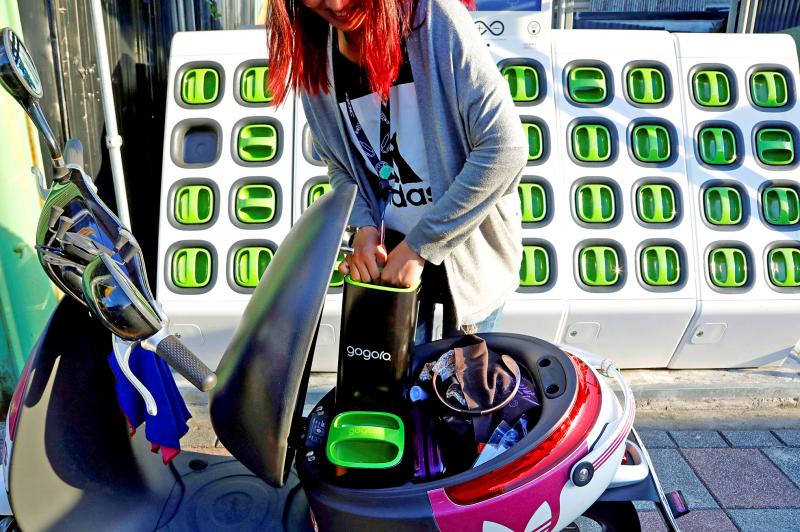Gogoro Inc (睿能創意) yesterday said it is on track to debut its shares on the NASDAQ by the end of this quarter through a merger with special-purpose acquisition company Poema Global Holdings Corp.
The Taoyuan-based electric scooter maker and battery swapping service provider made the comments after it gained Hero Motocorp, Engine No. 1 and other investors in the middle of last month, raising its oversubscribed private investment in public equity from US$257 million to US$285 million.
“We are working through due diligence for [the US Securities and Exchange Commission]. We should complete it, we hope, in the first week of March,” Gogoro chief financial officer Bruce Aitken told an online news conference. “We are on track to complete the overall transaction by the end of the first quarter. It is our goal.”

Photo: Tyrone Siu, Reuters
Gogoro shares would be listed on the NASDAQ under the stock symbol “GGR.”
Asked what attracted it to Gogoro, Engine No. 1 portfolio manager Edward Sun said that when he first met Gogoro founder and chief executive officer Horace Luke (陸學森) in 2017, Gogoro mostly focused on making hardware, or electric scooters.
Sun said he thought it might be too risky to bet on an electric scooter maker, but he became interested after Gogoro strategically shifted its business model to capitalize on selling green energy by subscription.
“Subscription is a high-margin business and is something sustainable,” he said.
The battery swapping service offered by Gogoro is a better solution than traditional charging methods, Sun said.
Furthermore, Gogoro’s new business model is “almost like the Android of the electric scooter world,” as it is forming partnerships with other vehicle makers, Sun said.
Those partnerships in China, India and Southeast Asia would greatly increase Gogoro’s chances of penetrating these emerging markets, he said.
The market size in China, India and Southeast Asia combined is 80 times larger than the market in Taiwan, he said, adding that in India, 82 percent of all vehicles are two wheelers, while the figure in Indonesia is even higher at 90 percent.
Gogoro last month said that it has teamed up with Electrum to build an electric vehicle ecosystem in Indonesia, the third-largest two-wheel vehicle market in the world, with a focus on two-wheel vehicles and developing a high-efficiency battery.
In China, Gogoro is partnering with China’s biggest scooter maker, Yadea Technology Group Co (雅迪科技集團), and Jiangmen Dachangjiang Group Co (大江集團).
Gogoro also plans to expand its reach into New Delhi by teaming up with Hero MotoCorp Ltd, India’s biggest motorcycle maker.
As an activist firm, Engine No. 1 helped ExxonMobil Corp and General Motors in slashing global carbon dioxide emissions, but Sun did not disclose any substantial plan to accelerate Gogoro’s decarbonization.
Engine No. 1 in May last year won a campaign to replace three seats on the board of Exxon Mobil, but it has no plan to take any seats on Gogoro’s board.
“Gogoro has a strong board. There is no reason to take a board seat,” Sun said.

PROTECTION: The investigation, which takes aim at exporters such as Canada, Germany and Brazil, came days after Trump unveiled tariff hikes on steel and aluminum products US President Donald Trump on Saturday ordered a probe into potential tariffs on lumber imports — a move threatening to stoke trade tensions — while also pushing for a domestic supply boost. Trump signed an executive order instructing US Secretary of Commerce Howard Lutnick to begin an investigation “to determine the effects on the national security of imports of timber, lumber and their derivative products.” The study might result in new tariffs being imposed, which would pile on top of existing levies. The investigation takes aim at exporters like Canada, Germany and Brazil, with White House officials earlier accusing these economies of

EARLY TALKS: Measures under consideration include convincing allies to match US curbs, further restricting exports of AI chips or GPUs, and blocking Chinese investments US President Donald Trump’s administration is sketching out tougher versions of US semiconductor curbs and pressuring key allies to escalate their restrictions on China’s chip industry, an early indication the new US president plans to expand efforts that began under former US president Joe Biden to limit Beijing’s technological prowess. Trump officials recently met with their Japanese and Dutch counterparts about restricting Tokyo Electron Ltd and ASML Holding NV engineers from maintaining semiconductor gear in China, people familiar with the matter said. The aim, which was also a priority for Biden, is to see key allies match China curbs the US

Teleperformance SE, the largest call-center operator in the world, is rolling out an artificial intelligence (AI) system that softens English-speaking Indian workers’ accents in real time in a move the company claims would make them more understandable. The technology, called accent translation, coupled with background noise cancelation, is being deployed in call centers in India, where workers provide customer support to some of Teleperformance’s international clients. The company provides outsourced customer support and content moderation to global companies including Apple Inc, ByteDance Ltd’s (字節跳動) TikTok and Samsung Electronics Co Ltd. “When you have an Indian agent on the line, sometimes it’s hard

‘SACRED MOUNTAIN’: The chipmaker can form joint ventures abroad, except in China, but like other firms, it needs government approval for large investments Taiwan Semiconductor Manufacturing Co (TSMC, 台積電) needs government permission for any overseas joint ventures (JVs), but there are no restrictions on making the most advanced chips overseas other than for China, Minister of Economic Affairs J.W. Kuo (郭智輝) said yesterday. US media have said that TSMC, the world’s largest contract chipmaker and a major supplier to companies such as Apple Inc and Nvidia Corp, has been in talks for a stake in Intel Corp. Neither company has confirmed the talks, but US President Donald Trump has accused Taiwan of taking away the US’ semiconductor business and said he wants the industry back